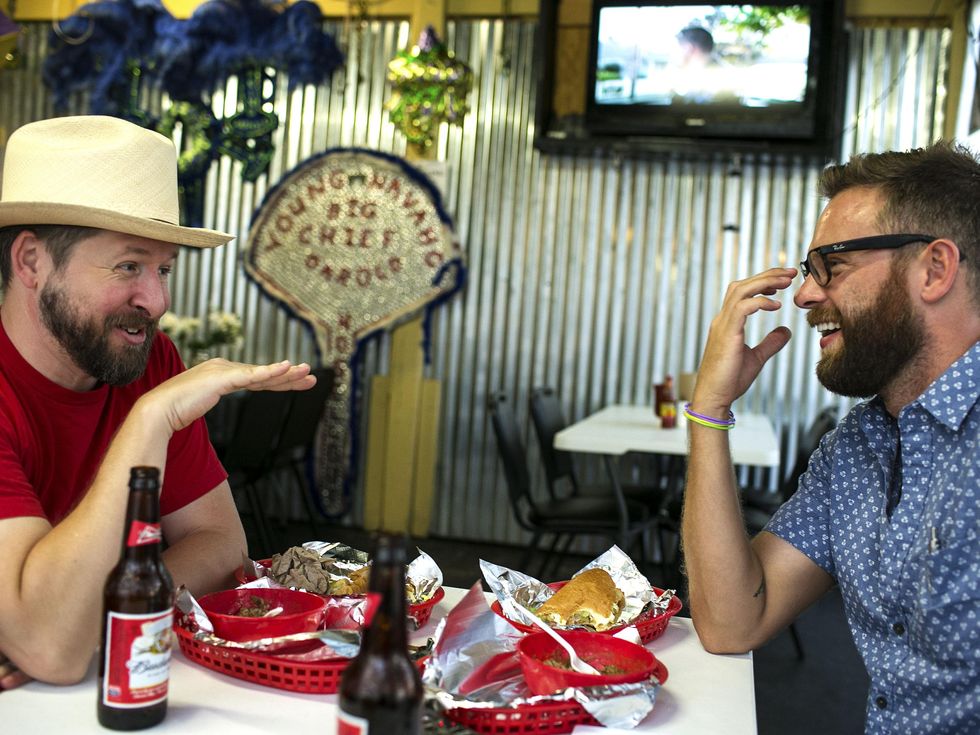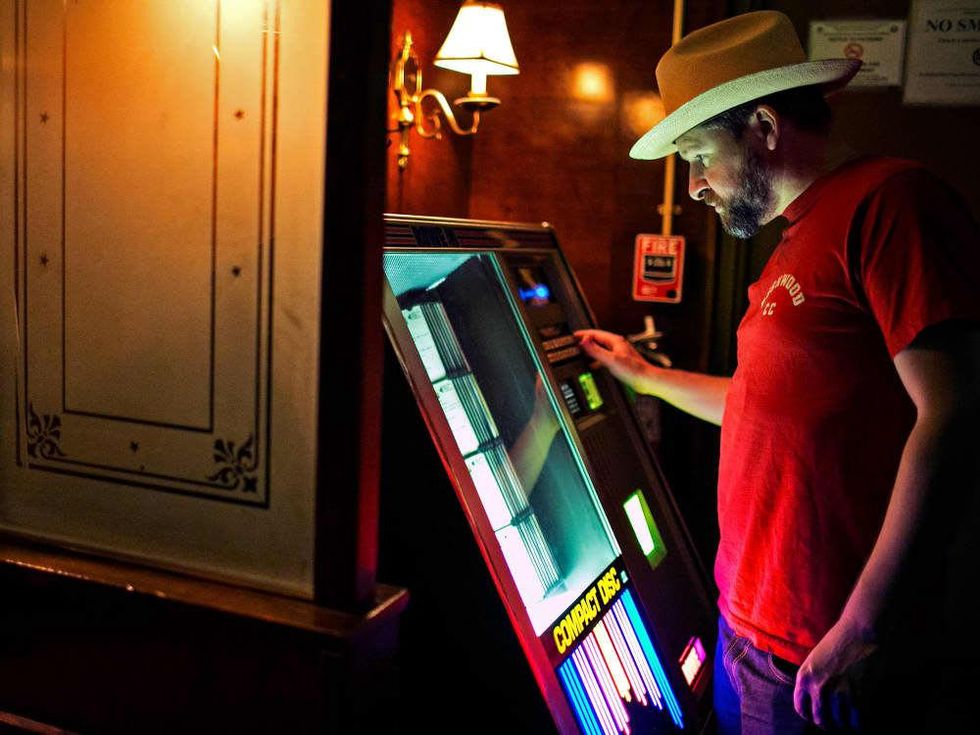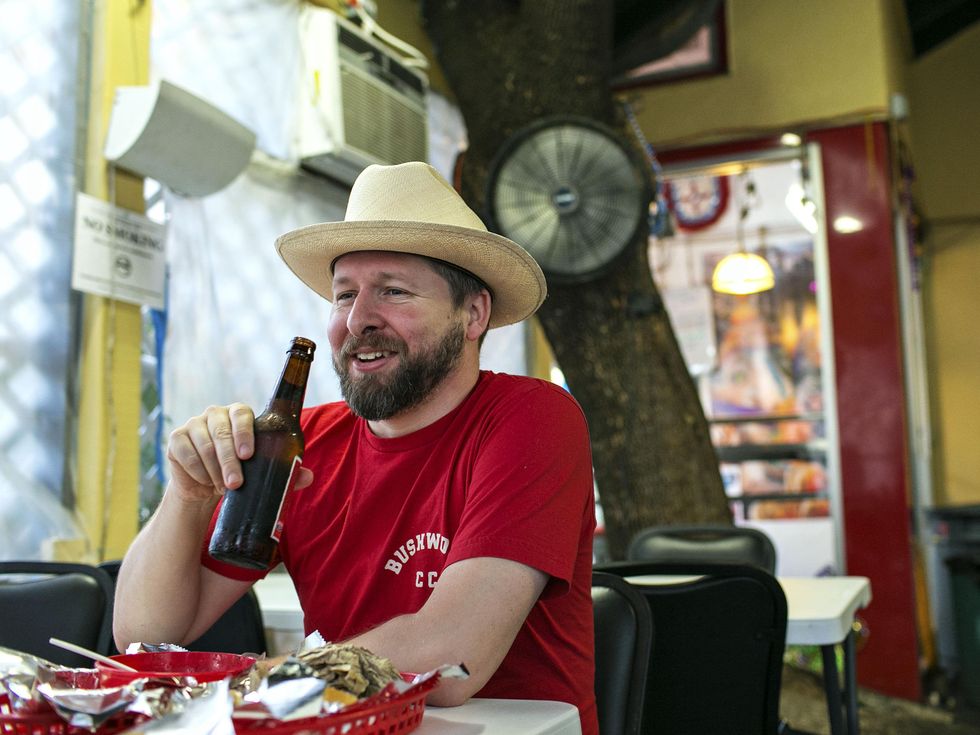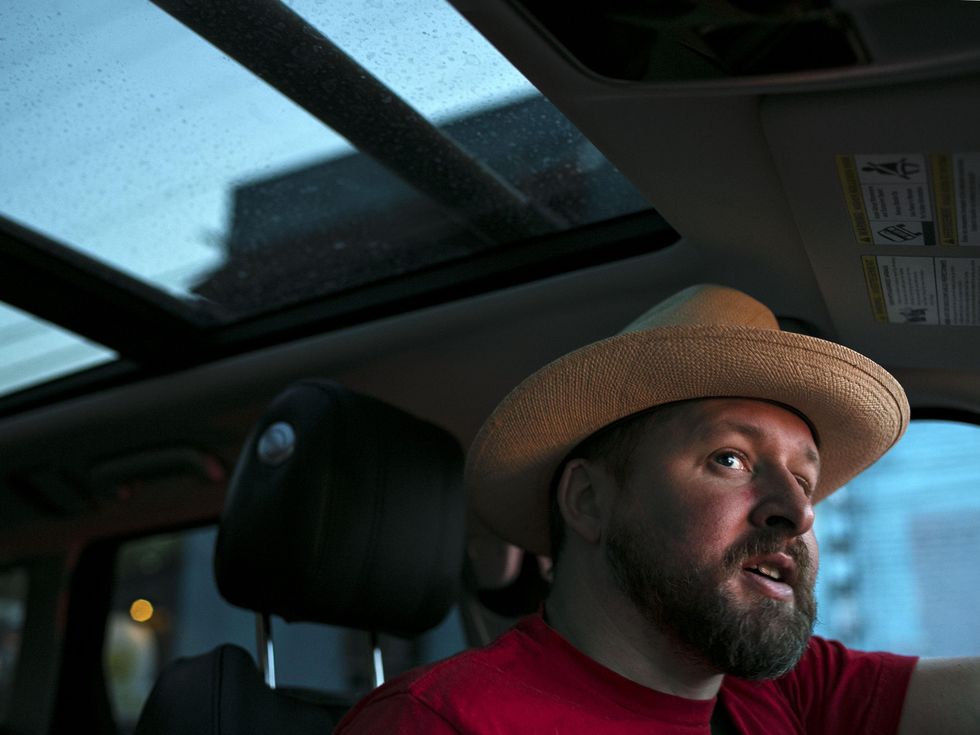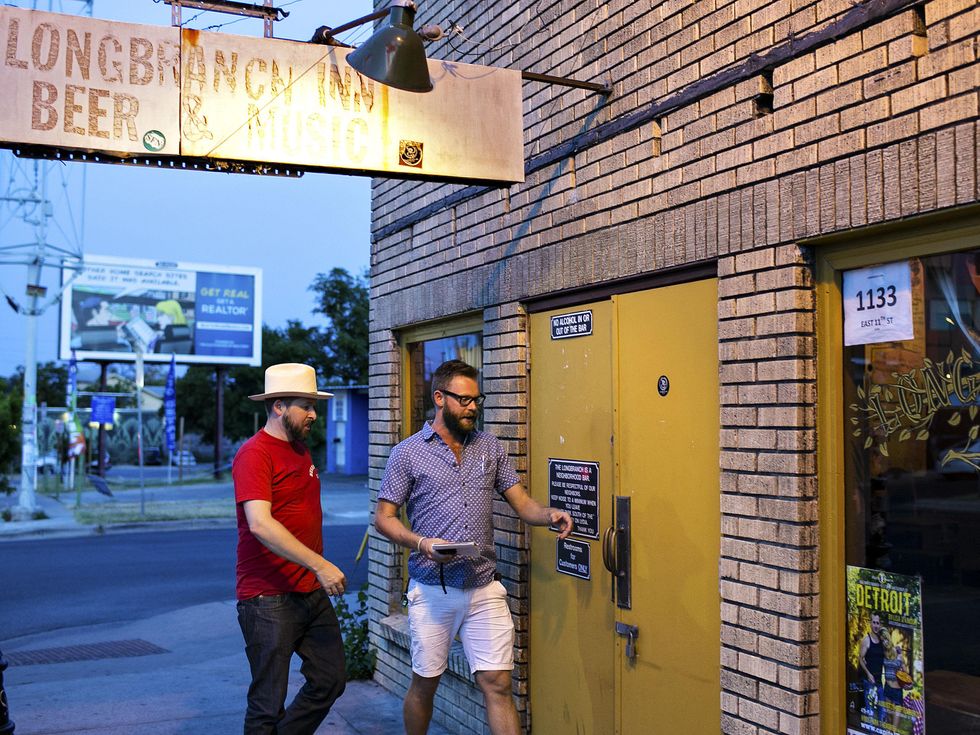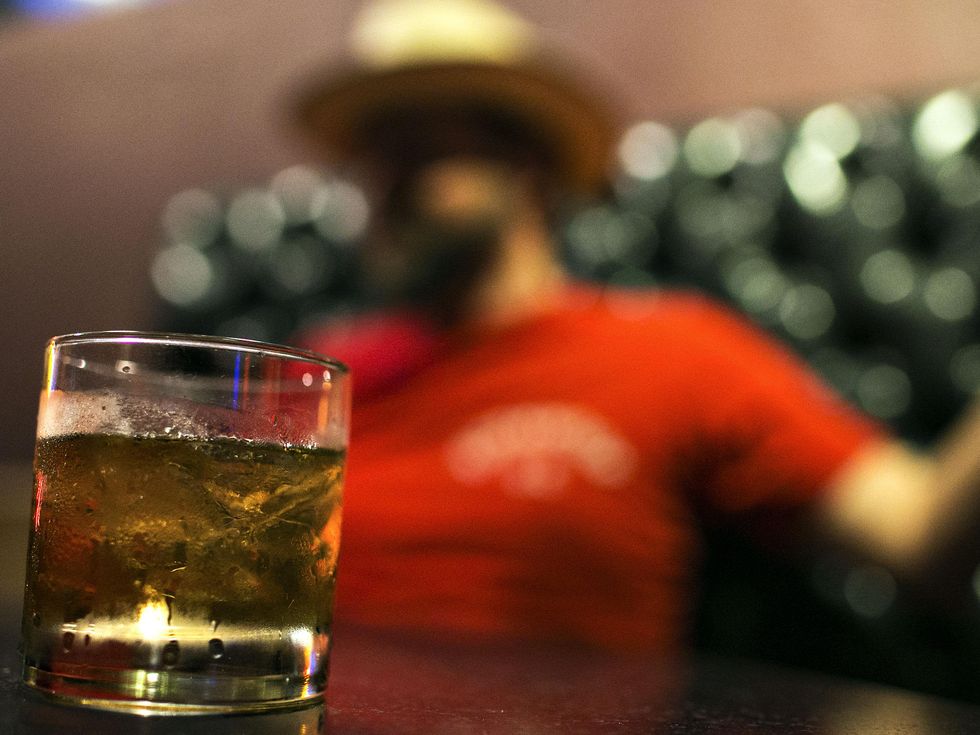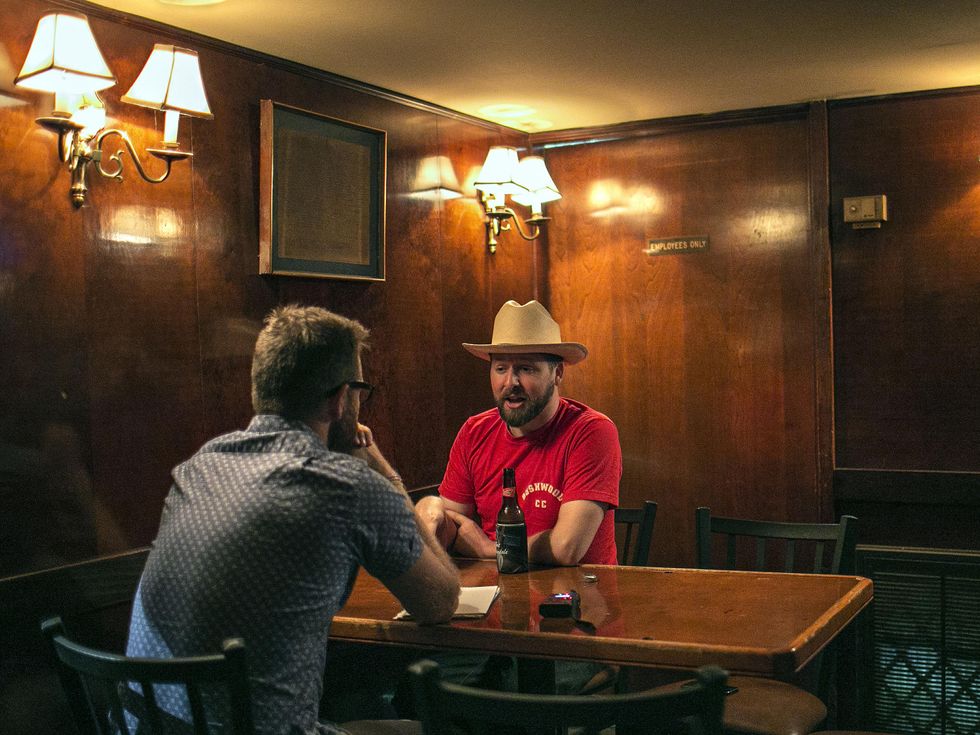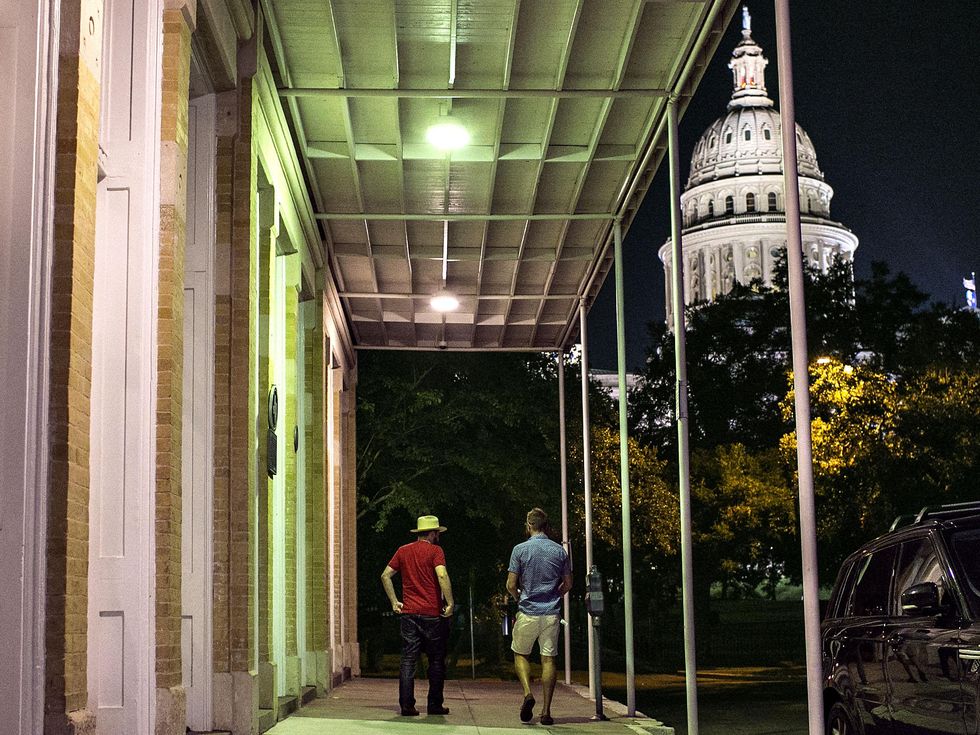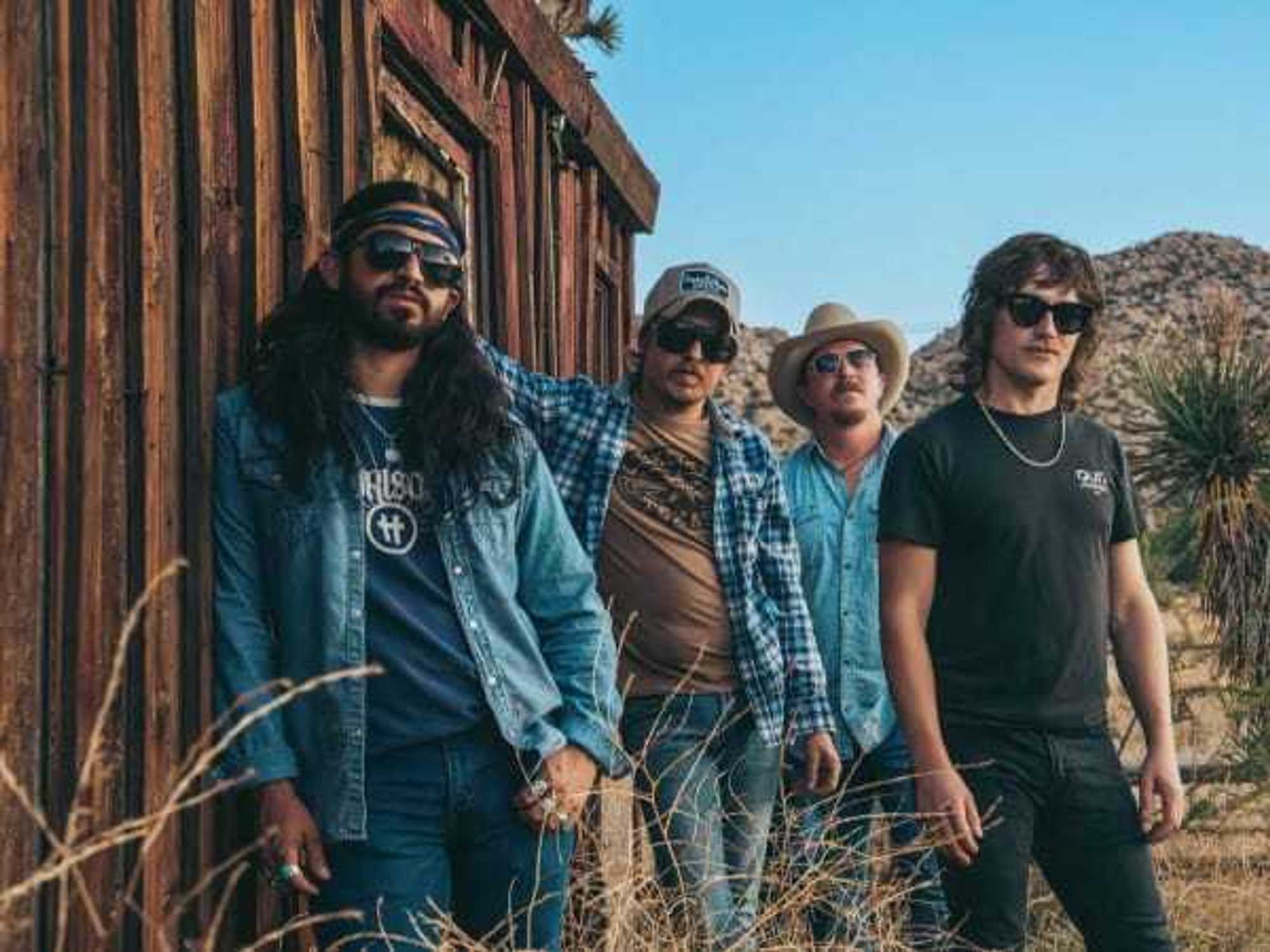Night Out with James Moody
A night out with an Austin legend: 2 beers and a scotch with Mohawk's James Moody
The sun has set on one of those scorching Austin evenings and James Moody is dropping me off on the east side. We’ve just finished a fantastic evening of cold beer, greasy food, good scotch and the kind of nonstop conversation that reminds me why I got into this industry in the first place. As I open the door to his hybrid SUV (he would prefer if I told you it was a ’57 Ford pickup) Moody surprises me. Laughing, he says, "Please don’t make me sound like an asshole."
We both laugh, shake hands and he drives off. I stand there wondering if we should have hugged instead. But that phrase sticks with me. An asshole? Tonight didn’t feel like work. It felt like quality male bonding time. I never once thought, ‘Oh, brother. What an a-hole.’
Then again, it sort of feels like you can’t do anything new in this town without ruffling some feathers — or even making a few enemies. And I’m guessing you don’t become a major player in the reinvention of Austin's music scene without getting called an asshole at least couple of times.
The Original New Orleans Po-Boy and Gumbo Shop
Decked in his signature boots and cowboy hat, with a red T-shirt and blue jeans, Moody saunters into The Original New Orleans Po-Boy and Gumbo Shop on East Cesar Chavez. We’ve met a couple times before, but only casually. We immediately get down to business: grub. Moody orders a 6-inch shrimp po’boy with extra pickles, a half pint of gumbo and a Budweiser. I follow suit.
New Orleans brass music blares from Mardi Gras bead-covered speakers as we chow down. When I ask why he chose this place, Moody quickly replies, "It’s the only place in town you can hear a second line."
Though he was born in Northern California, Moody's dad's job with the Air Force forced the family to move a lot. In addition to living in Louisiana (his family originally hails from there), they lived in Nebraska, Germany, South Dakota and Los Angeles, among other places. But ask him where he’s from and he proudly says, "New Orleans."
"We’re a bunch of y’ats," Moody says as our buttery fried shrimp po’boys arrive. "It stands for a bunch of folks that when they see each other they say, ‘Where y’at?’ It means how ya doin’."
Moody drives back Louisiana a lot and shares his secrets for the best pit stops along the way. His love of Louisiana food and culture is contagious. "You gotta be able to go get down with the y’ats and really understand the whole culture to really make the food," he says. While we eat, Moody shares stories from growing up and interjects with great impressions of his Southern family.
The way he talks about it, I wish I was a y’at.
By our second beer, we've moved on from Louisiana and I learn why Moody eventually landed in Austin. After college, he scored a gig in Louisiana selling Claritin just as the drug was launching in the U.S. Turns out Moody was really good at it and he began his career in sales before later working on branding the drug across the U.S. and Europe.
"I was wearing a suit every day, getting off work, putting my Converse on [and] changing in the car ... At that point I was screwed."
"Since I was single, they would send me in to fix broken markets. They were like, ‘Moody will do it, Moody’ll do anything.’ And I would. If I had a decent place to live and I could go see shows or whatever I would go," he explains.
Then one day, the company was bought out and despite his success, he faced a potential layoff. His boss recommended he move to keep his job.
"I picked Austin, sight unseen," he explains. "I had never been. But I had been recording [episodes of] Austin City Limits for years. I had Willie’s stuff, Johnny Cash’s stuff, Stevie Ray’s. And that was the only reason. I heard it was awesome and so they moved me to Austin."
However, Moody's first impression of Austin was less than stellar. After landing at the airport in 1999, he rented a white Buick Skylark and drove into the city. But a wrong turn onto Highway 183 put him at a different kind of Austin destination.
"The first place I see in the city is the Arboretum," Moody reminisces. "So I stop and I get a hotel. I think I’m in downtown Austin. I get dressed and I’m truckin’ around the Arboretum, calling my buddies being like, 'This is alright, but it’s not like everything people say it is. I’m at a TGI Fridays.'"
Once Moody actually figured out where downtown was, he was blown away by the music scene and venues like Lovejoys, Emo’s, the Mercury Lounge and Beerland.
"I was wearing a suit every day, getting off work, putting my Converse on [and] changing in the car," he says. "At that point I was screwed. I didn’t know I was screwed. But that was the beginning of the end for me working for that company."
Longbranch Inn
As "Louie Louie" blasts through the jukebox at Longbranch Inn, Moody and I order a couple of Macallan 12s on the rocks and scoot in to a table. It’s pretty desolate in the bar, but then again we are out drinking on a Wednesday night.
"When you move around like I have, you learn the ability to make friends quickly," he muses. "It’s because you don’t want to be the kid sitting at the cafeteria by yourself. You learn that at a very young age. But you get antsy after about two or three years, and you don’t even know why. Austin’s the first time I’ve ever stopped — and the longest I’ve ever stayed in once place."
"Bob Schneider and Topaz were on the schedule and the first order of business was to cancel their show ... It was no offense to them, but we wanted to totally break the mold for what we wanted to do in there."
At 38, Moody has a youthful demeanor. He keeps a short beard (but has enjoyed a much fuller one in days past as a member of the Austin Facial Hair Club); only the few whisks of gray in the beard betray his age. As the night rolls on, Moody talks about his teenage years and paints a very different picture.
"I was making two-piece meals at midnight at KFC in East LA. Back then I was bald, [with] braces … in Dickies, Dr. Martens, 115 pounds and pissed off," he laughs. "But that’s when I really cut my teeth on the Southern California late-'80s punk scene. It doesn’t sound very punk, but at the time Green Day, The Offspring, Bad Religion, Fugazi and Fear ... were all really small bands. And we would go see them all the time."
But how did a punk-loving, Southern nomad with a knack for sales end up buying the bar that would transform the Red River district? "My friends threw a surprise party on my 30th birthday at [The Mohawk’s current] location. Back then it was called Velvet Spade and we booked my favorite band at the time, the FMCKB, which stands for the Foggy Mountain Cop Killin Boyz, the kings of turbo gangster country. One of the greatest bands to ever rock the tits off of Austin, Texas. So that happened."
As Moody tells it, the bar brought in so much the night of his party they asked Moody and his friends to throw another one. "We thought we could do this at least once a week."
And so Moody cashed out his 401(k) and bought what would become The Mohawk. A risky move by all accounts, the club’s location on 10th Street and Red River was pretty dicey at the time, and its previous incarnations hadn’t been very successful.
Moody and crew took these risks a step further by alienating some of the stalwarts of the Austin music scene. "Bob Schneider and Topaz were on the schedule and the first order of business was to cancel their show. I wasn’t going to perpetuate the sins of the past in that space. It was no offense to them, but we wanted to totally break the mold for what we wanted to do in there," he says.
"The Austin Chronicle got mad," he adds.
And thus Moody adapted a business model that he says is still in place today. "We started putting in the kind of stuff we liked listening to [like] fun indie rock, electronica and dance music, sweater rock, sad bastard music, a lot of punk and metal stuff," he says. "We were the first ones to start doing hip-hop in a formal way. I put Ice Cube in there for Christmas one year. It was badass! I did 2 Live Crew, Too Short, KRS-One, all out of the gate not knowing that no one was doing that."
And the model worked. Through the Mohawk, Moody met Graham Williams and together they created Transmission Events in 2006 to do the booking. Transmission has since turned into an entertainment company that, according to Moody, put on 720 shows across Texas last year with a staff of only 16. Their motto? "Good Times, Inc." In addition to the Mohawk, Moody has helped develop Fun Fun Fun Fest into the music, comedy, sports, taco-blasting, internationally renowned spectacular it is today. Today, he spends most of his time at the creative agency Guerilla Suit, which he also co-founded.
The Cloak Room
For many, The Cloak Room is a last bastion of "old Austin." An incredibly dark, windowless, basement lounge next to the Texas State Capitol, the Cloak Room is known for cranky bartenders, an amazing jukebox and rumored House of Cards-style political deals. It is also the perfect place for a nightcap. I grab two Budweisers at the bar while Moody loads up the jukebox with old country, kicking things off with Merle Haggard’s "Okie From Muskogee."
Moody grabs a seat in the corner of the bar and begins talking about the current state of Austin's music scene. "This idea of what Red River means to this community ... I don’t know if everyone sits around the dinner table and talks about it, but if it were to all go away, they would be freaked out."
While Austin certainly has a storied musical history, it's only been recently that the industry has banded together to work towards the same goals. And Moody has been at the center of many of these efforts. Working with C3 Presents and SXSW, he founded nonprofit Austin Music People in 2011 to politically advocate for the music industry. He also recently he helped establish the Red River Cultural District.
Moody also hastily worked with SXSW and the Austin Community Foundation back in March immediately following the Red River tragedy, when a driver plowed through police barricades and people on the street, killing four and injuring dozens — many directly in front of the Mohawk. The following day, SXSW Cares was formed and has since raised over $250,000 to help those affected by the tragedy.
"I hope we don’t let the market dictate what happens on Red River. I hope we can hang on to the stuff we think is cool."
Our conversation takes a very serious turn when we begin talking about the tragic events of that morning. It’s obvious those memories are still very raw and he struggles to piece together the right words. But he makes it clear how proud he is of his team. "I’ve got an entire staff of people that were doing triage, shirtless, out in the middle of the street. They don’t even know how to do that shit. I’ve got people on my team that will be dealing with this for the rest of their lives … You can never be prepared to see that much blood."
The jukebox stops and changes tracks and there’s silence in the sparsely populated lounge. Another old country song comes on. This one I don’t recognize, but I don’t ask what it is.
As the evening waltzes on, it becomes clear that Austin has become Moody's home. He’s currently remodeling his house in South Austin and mentions several times how much he loves his "damn dog," a three-year-old boxer named Louise (after Louisiana).
But he still has an insatiable wanderlust.
Single with no kids, he travels as much as he can. Whether it’s a fishing trip with his dad, or trekking across Africa, adventure is his number one hobby. In fact, most of our remaining conversation is spent talking about the places we’ve traveled and talking about what we have in common. Moody spends a surprising amount of time asking me about my life and offering advice. I suspect many people find they have a lot in common with Moody. He seems like the kind of guy who’s never met a stranger.
Heading back to the east side, I ask Moody where he likes to go out and he tells me, "I get less excited about [going to] just a bar these days, because we have so many of them." He continues, "Instead of drinking six beers in one spot, [the nightlife crowd] are drinking one beer in six spots. I think everyone needs to be aware of that and sort of pump the brakes."
"Grumpy Moody" (as he calls it), thinks there are too many bars opening. It isn't that he doesn't want the competition, I think it is that he wants to keep Austin special. And while he likes how so many new places on the east and south sides are from locals who build creative concepts on a budget, it’s the rapid sprawl happening all over Austin that worries him.
He ponders the big picture over the last sip of beer. "There’s a bit of a thing happening where we need six new hotels, but we’re building 11. What about cool sustainable growth? I hope we can figure out transportation, figure out housing. I hope we don’t let the market dictate what happens on Red River. I hope we can hang on to the stuff we think is cool. It would be really nice to weather this storm and say, ‘Beerland is still here. The White Horse is still here.’ I hope South First stays cool. I just wanna hang on tight and hopefully be here for it all. I like this place."
Spoken like a true, Austin-loving, non-asshole.
